
The Wright State School of Professional Psychology currently produces more clinical psychologists than all of Ohio’s other public universities combined, including The Ohio State University and the University of Cincinnati.
Wright State’s School of Professional Psychology is gearing up for the largest enrollment in its history. And the school is going to be taking on a more international flavor.
SOPP normally enrolls about 25 new students each year and currently has 106. This fall, 35 new students are expected to enroll, pushing the school total to 141.
“We need to grow,” said Larry James, Ph.D., dean of SOPP. “The mental health need is there. It’s just that simple. But we’re going to grow in a very controlled, calculated, purposeful-type way.”
SOPP currently produces more clinical psychologists than all of Ohio’s other public universities combined, including The Ohio State University and the University of Cincinnati.
The traditional Ph.D. in psychology program takes in four to eight students a year. Because of the dissertation requirement, those students often graduate at different times, so the incoming class doesn’t graduate together. At Wright State, which offers a Psy.D. doctoral degree, the classes are larger and the students usually graduate together.
Graduates go into private practice or get jobs in hospitals, university counseling centers, Veterans Administration facilities, military installations, prisons and in other places.
“We have a huge mental-health imprint in the state,” James said.
He said demand for clinical psychologists has increased significantly over the past five years as a struggling economy produced higher levels of spouse abuse, alcoholism, depression, suicides and post-traumatic stress disorder.
Jobs for psychologists are expected to grow by about 12 percent through 2018, according to the Occupational Outlook Handbook. Increased demand for psychological services in hospitals, schools, social service agencies, mental health centers, substance abuse treatment clinics and private companies is expected to drive the need.
SOPP once received several hundred student applications to fill 25 slots. Because of increased competition by schools in Ohio, Illinois, Kentucky, West Virginia, Virginia and Washington, D.C., SOPP now gets fewer than 200 applications annually. James said the school is stepping up its recruiting.
“If we don’t aggressively go after those 200 or so applicants, they’ll be recruited by less competitive programs,” said James.
He said the standards for admission will not change.
“We turn people away every year,” said James. “We spend considerable time deciding on who we believe are the best applicants.”
He said SOPP plans to bolster its staff of about 20 full-time professors with adjunct instructors to help carry the extra load.
“Our first priority is to train you as a generalist, a good practicing psychologist,” James said. “You can work with the geriatric population, you can work with kids, adults, you can work with people who have substance-abuse problems. We want to train you broad enough so you’ll be prepared to go down whatever road you want to go.”
In addition to the new enrollments from U.S. students, SOPP will also have an influx of students from Nigeria and India beginning in January.
“Not only are we expanding our already existing doctoral program, we’re going international,” James said.
SOPP will provide a 12-month curriculum that will clinically train doctoral students from Benue State University in Nigeria. The school will also offer a program in which students at St. Xavier College in Mumbai, India, will be able to complete their master’s degrees at SOPP and then matriculate into the SOPP doctoral program.
The two international programs are expected to add seven to 15 new students to the SOPP classes.

 Gov. DeWine reappoints Board Treasurer Beth Ferris and names student Ella Vaught to Wright State Board of Trustees
Gov. DeWine reappoints Board Treasurer Beth Ferris and names student Ella Vaught to Wright State Board of Trustees  Joe Gruenberg’s 40-Year support for Wright State celebrated with Honorary Alumnus Award
Joe Gruenberg’s 40-Year support for Wright State celebrated with Honorary Alumnus Award  Wright State’s elementary education program earns A+ rating for math teacher training
Wright State’s elementary education program earns A+ rating for math teacher training  Wright State’s Calamityville hosts its largest joint medical training operation
Wright State’s Calamityville hosts its largest joint medical training operation  Wright State University launches Strategic Plan 2030 to advance student success, enhance role as regional economic driver
Wright State University launches Strategic Plan 2030 to advance student success, enhance role as regional economic driver 